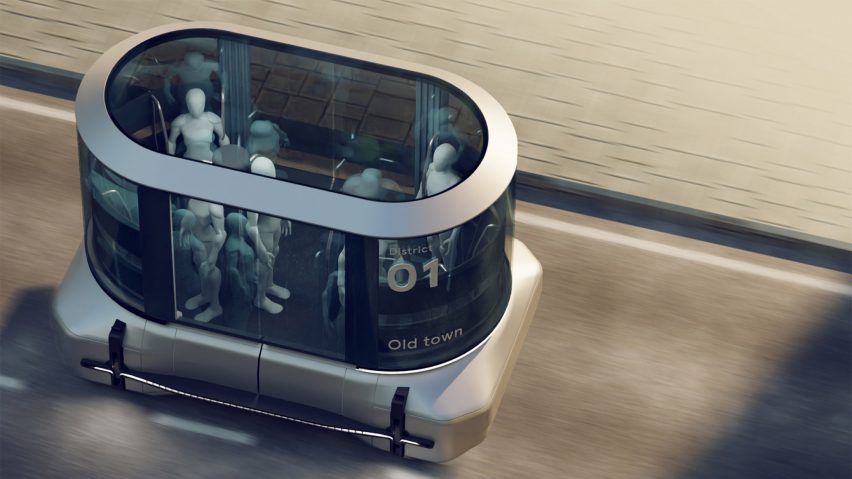The second finalist in Dezeen's Future Mobility Competition powered by Arrival is Daniel Czyszczon, who has proposed a public transport network with small electric vehicles called Flowee.
Czyszczon's Flowee proposal reimagines the traditional bus as a compact electric urban vehicle with a capacity of 14 passengers, including accessible seating.
Based on a cogwheel system, in which multiple moving parts work together as one mechanism, Czyszczon's concept comprises a series of circular routes where the vehicles move across tracks that interlink with neighbouring routes.
This means that passengers can transfer directly from vehicle to vehicle to complete their journey.
When required, each orbit can be adapted to cater for the flow of traffic within each district.
Czyszczon designed the concept for the city of Kraków, Poland, as an alternative to traditional public transport.
Read more about the proposal below:
Flowee
Daniel Czyszczon
Kraków, Poland
Finalist
"Kraków is a city located in southern Poland with a population of around 760,000. Public transport in Kraków is maintained at a very high level, but the inhabitants face many problems.
"One of the main problems is the level of traffic jams. The vast majority of residents prefer to use their own vehicles, which causes huge traffic jams.
"Interestingly, it is very difficult to predict where the biggest congestion is, and the traffic jam situation on the roads changes very dynamically. It is very difficult to estimate the travel time or which means of transport to use.
"Flowee is a concept for an electric urban vehicle as a sustainable alternative to classic public transport vehicles.
"The concept is a vehicle that moves in a circular way in strictly defined circles. The first difference from classic public transport vehicles is that Flowee does not move from A to B crossing the whole city, but within one city district.
"It can help the community to move to their nearest destinations, increasing the importance of the local community and entrepreneurship.
"Flowee moves in a similar way to a cogwheel, which makes the different vehicles meet at a stop, allowing for direct transfers between vehicles."
Future Mobility Competition
The Future Mobility Competition is a global design contest that seeks to support emerging talent, bringing radical solutions to solve mobility challenges in cities and, in turn, create true sustainability and empower local communities.
Launched in partnership with electric vehicle company Arrival, the contest asked entrants to identify problems with mobility in their city, or a city they are familiar with, and propose solutions that will improve how people move around their environment.
The contest received over 170 entries from more than 45 different countries around the world.
The entries were assessed by a judging panel comprising Kunlé Adeyemi of architecture, design and urbanism studio NLÉ, Elizabeth Diller of New York studio Diller Scofidio + Renfro, Yves Béhar of Fuseproject, Jeremy Offer and Martina Wierzbicki from Arrival, as well as Marcus Fairs and Cajsa Carlson from Dezeen.
The panel selected 10 proposals as finalists to be published on Dezeen. We are unveiling one finalist a day from 27 June, culminating in the winner being announced on 8 July.
The winner will win the top prize of $25,000, while the runner-up will receive $15,000 and the third-placed entrant will receive $10,000. Each of the seven remaining finalists will receive prize money of $5,000.
Find out more about the Future Mobility Competition ›
See all the finalists revealed so far ›
Partnership content
The Future Mobility Competition powered by Arrival is a partnership between Dezeen and Arrival. Find out more about Dezeen partnership content here.

